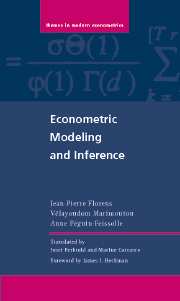Book contents
- Frontmatter
- Contents
- Foreword
- Preface
- I Statistical Methods
- II Regression Models
- 7 Conditional Expectation
- 8 Univariate Regression
- 9 Generalized Least Squares Method, Heteroskedasticity, and Multivariate Regression
- 10 Nonparametric Estimation of the Regression
- 11 Discrete Variables and Partially Observed Models
- III Dynamic Models
- IV Structural Modeling
- Bibliography
- Index
10 - Nonparametric Estimation of the Regression
- Frontmatter
- Contents
- Foreword
- Preface
- I Statistical Methods
- II Regression Models
- 7 Conditional Expectation
- 8 Univariate Regression
- 9 Generalized Least Squares Method, Heteroskedasticity, and Multivariate Regression
- 10 Nonparametric Estimation of the Regression
- 11 Discrete Variables and Partially Observed Models
- III Dynamic Models
- IV Structural Modeling
- Bibliography
- Index
Summary
Introduction
In contrast to other fields, the economic theory rarely specifies functional forms but usually specifies only a list of relevant variables to explain a phenomenon. The specification of the form of the relationship largely results from the empirical study which yields a “good” model which “works well.” A first level of the analysis consists in writing a (linear, loglinear, nonlinear, …) model and in estimating it without taking the approximating nature of the model into account. This approach was explained in Chapters 7, 8, and 9. A second approach consists in specifying a parametric model whose incorrect specification is explicit. This leads for instance to correct the expression for the variances or to choose robust methods to the misspecification. This methodology was the topic of Chapter 9.
Finally, it is possible to free oneself of all specification constraints by adopting a nonparametric approach to the estimation of the regression, an approach in which the data itself chooses the form of the function of interest.
Various estimation methods of the nonparametric regression have been developed and are now commonly employed. We will present here the kernel method (corresponding to what we presented in Chapter 5). This method is simple but is dominated in some cases by other approaches (local polynomial, Fourier series expansion, wavelets …).
Information
- Type
- Chapter
- Information
- Econometric Modeling and Inference , pp. 213 - 233Publisher: Cambridge University PressPrint publication year: 2007
